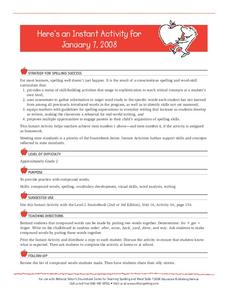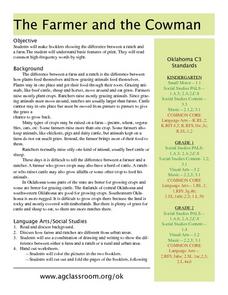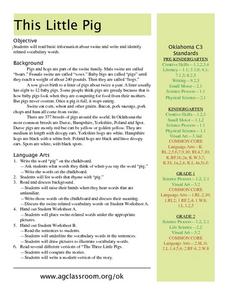Curated OER
Bee Pollen Popular
The world would be a much different place without the help of pollinators. Read about the important role bats, hummingbirds, and various insects play in plant reproduction, exploring the interdependence of living things in an ecosystem....
Random House
Recipe for an Ecosystem
Creating an ecosystem is as simple as baking a cake. Well, maybe not, but using a recipe analogy helps learners realize that ecosystems consist of different components that come together in unique ways. Offer this worksheet as an...
Curated OER
Compound Words
What's a compound word? Help your class understand the meaning of a compound word, and then give them the included worksheet to practice. To complete it, they write the two parts of a compound word and the new word formed in the spaces...
Curated OER
No Foot, No Horse
Why do horses wear shoes? Why do people wear shoes? Using worksheets, which are embedded in the plan, learners write descriptive paragraphs about their own shoes, classify a pile of shoes, and also engage in math games about the variety...
Curated OER
Prefixes
Learners explore prefixes, and how they help us decipher unknown words. Decode and define the meaning of boldface words with prefixes used in context on a classroom chart. Writers complete a worksheet practicing the same skill.
Curated OER
Compound Words
These parts of compound words are printed on jigsaw puzzle pieces to demonstrate how they fit together to form complete words. Learners pair the grey pieces with their corresponding white pieces to form compound words and then write them...
Curated OER
Muddles Doubles!
These compound words are all mixed up! Learners examine eight words that need to be reorganized, writing the correct words on this instructional activity. Next, they think up some compound words of their own. Finally, learners complete...
Curated OER
Dictionary
Discovering different ways to use a dictionary to find the meaning of unknown words is the focus of this language arts lesson. Everyone reads a story and practices finding unknown words in the dictionary.
Curated OER
Cause and Effect Relationships
Cause and effect relationships can be found in life and in literature. Enthusiastic readers will find and discuss all of the cause and effect relationships in the story, Alexander and the Terrible, Horrible, No Good, Very Bad Day. The...
Curated OER
Distinguish Fact from Opinion in Passage
Is it a fact or is it an opinion; readers need to know. Second graders learn a new technique to determine if a sentence or reading passage is fact based or opinion based. They read and then ask evidence based questions to determine if...
Curated OER
Oklahoma's Berry Best
Ask your learners to complete activities related to Oklahoma's agriculture, berries in particular. The lesson is cross-curricular and has class members investigate an article about berries, write an acrostic poem, and discuss new...
Creative Educator
Amazing Animal Alliterations
Creatures can cause creativity! Alliteration can make writing more enjoyable and entertaining. Help your pupils grasp this concept by using animals as inspiration for alliterative sentences. Prepare your class for the activities by first...
Curated OER
The Farmer and the Cowman
What is the difference between a ranch and a farm? After reading and discussing the provided background information, young agriculturalists will color, cut, and create neat little booklets that show the differences between ranches and...
Curated OER
Beef or Dairy?
Guernsey, Jersey, Holstein. Brangus, Charoloais, Herford. Here’s a truly cross-curricular resource that combines language arts, science, math, and visual arts activities as class members learn to distinguish between beef and dairy...
Curated OER
The Fable of Franny And Her Fabulous Fainting Goat
Mix the art of reading comprehension with the skill of telling time. Children in grades two and three will discuss the importance of goats throughout history based on the provided background information. They'll create cute goat clocks...
Curated OER
This Little Pig
First graders study basic information about swine. They write and identify vocabulary words relating to the subject. They write a recipe for "Pigs in a Blanket," using canned crescent rolls and small sausages. They trade recipes and...
Curated OER
Bee Dance
Everything a bee does serves a purpose. Learners in grades one through five explore the behaviors of bees through reading and dramatic puppet play. First children will create honey bee puppets, then they will discuss how bees dance to...
Curated OER
A Field of Beans
Beans, or legumes as they are sometimes called, are the topic for an integrated multi-subject lesson. Youngsters will read, write, observe, and research everything there is to know about beans. They read a bean story, conduct a bean...
Curated OER
Plant Parts We Eat
I bet the kids in your class will love to eat their vegetables after an engaging lesson about edible plants. They read information about vegetables and edible plants, sort vocabulary words, identify plant parts, measure and graph the...
Curated OER
Lesson 3: Encyclopedias
After being introduced to non-fiction texts, second graders meet a different type of non-fiction text that can help them locate factual information. They discuss and examine all of the features found in typical encyclopedias such as,...
Curated OER
Causes
What makes someone cry? Little learners read the story, Why Do You Cry?: Not a Sob Story by Kate Klise to discover a bit about crying and a bit about cause and effect. They'll fill out a cause and effect chart while they discuss and...
Curated OER
Lesson 2: Distinguish Fact from Opinion in Books
An important part of reading informational text is being able to discern fact from opinion. The class reads chapter one from the book, Penguins by Lynn M. Stone. They analyze specific sections of the text to determine if what is being...
Curated OER
Sorting in More than One Way
Sorting, categorizing, and classifying are skills learners must master for many different reasons. The class will work in small groups to list, classify, and sort a stack of familiar books. The neat part about the lesson is that the...
Curated OER
Lesson 1: Figurative Language
The story Once in a Blue Moon by Nicola Morgan is full of figurative language. Second graders choose one idiom from the story and create an illustration of its meaning. Handouts and structured vocabulary practice is included with the...

























